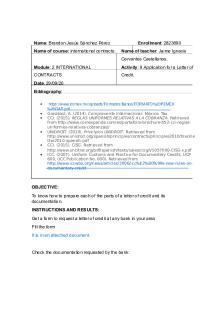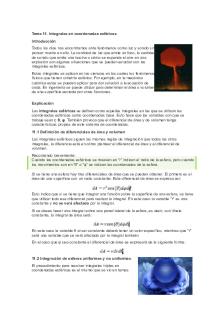Activity 13 - modulo 3 PDF

| Title | Activity 13 - modulo 3 |
|---|---|
| Author | Brandon sanchez |
| Course | Contratos Internacionales |
| Institution | Universidad TecMilenio |
| Pages | 4 |
| File Size | 105.4 KB |
| File Type | |
| Total Downloads | 40 |
| Total Views | 178 |
Summary
modulo 3...
Description
Name: Brandon Jesús Sánchez Pérez
Enrollment: 2823890
Name of course: international
Name of teacher: Jaime Ignacio
contracts.
Cervantes Castellanos.
Module: 3 Dispute Settlement in
Activity: 13 Analysis of a case
International Contracts
through mediation
Date: 29/10/20 Bibliography:
Ozuna, A. (2014). Compraventa Internacional. México: Tax. UNIDROIT. (2010). Principios UNIDROIT. Retrieved from http://www.unidroit.org/spanish/principles/contracts/principles2010/blackle tter2010-spanish.pdf SRE. (2015). Trado. del NAFTA: Solución de Controversias. Retrieved from http://www.sice.oas.org/trade/nafta_s/CAP20.asp https://elpais.com/economia/2018/06/04/actualidad/1528128348_491764. html
OBJECTIVE: To analyze a practical case by means of mediation. INSTRUCTIONS AND RESULTS: 1. Analyze the FTA of Mexico with the EU. 1. http://www.sice.oas.org/trade/nafta_s/CAP20.asp 2. Locate the dispute resolution section. 1. http://www.sice.oas.org/trade/nafta_s/CAP20.asp 3. Analyzes a case of conflict resolution between member countries, and involving Mexico. Mexico will litigate against the United States in the WTO for the tariff on steel and aluminum
Mexico joins the crusade of the European Union and Canada against US tariffs on steel and aluminum. The Executive of Enrique Peña Nieto has announced this Monday that it will initiate a dispute resolution process
before the World Trade Organization (WTO, the world arbitrator in the matter of exchanges of goods and services) considering that the decision of the Trump Administration to tax Mexican shipments arguing for "national security" reasons violate the regulations of the international organization itself.
"The Government of Mexico," underlines the note in which they communicate the measure, "endorses that its actions will continue to adhere to the rule of international commercial law and will be proportional to the damage that Mexico unfortunately receives." The North American trade conflict continues to escalate in the midst of the renegotiation of the FTA, which unites the United States, Mexico and Canada since 1994 and that Trump threatens to blow up if his partners do not accept the controversial demands that Washington has put on the table. "With this movement, the intention of Mexico, Europe and Canada", values José Luis de la Cruz, director of the Institute for Industrial Development and Economic Growth, "is to involve the WTO in the case." "Neither that body, nor the OECD [the Organization for Economic Cooperation and Development], nor the IMF [the International Monetary Fund] have so far spoken out against these new tariffs." However, De la Cruz emphasizes the difficulty of the US argument of risk to its national security. "It will be very difficult to judge: it is not just an economic reason, but it moves on a much muddier terrain."
Last week - immediately after the US Department of Commerce made public its decision to impose a 25% tariff on steel and 10% on imported aluminum from Europe, Canada and Mexico - the first two blocks already announced its decision to appeal the measure to the WTO. "If countries do not comply with trade rules," warned Community Trade Minister Cecilia Malmström, the multilateral system could collapse. "Along the same lines, Canadian Prime Minister Justin Trudeau said he did not see" signs of common sense. " in the White House. "Let's be clear: these tariffs are unacceptable." In Ottawa and Brussels, as in Mexico City, what bothers the most is the argument used by Washington to impose the tariff: that the US is hiding behind its national security to harm three of its most loyal partners, both commercially and geopolitical.
The Latin American country then limited itself to returning the protectionist measure to its northern neighbor and, by far, the first trading partner with restrictions on the entry of flat steel and a good number of foods
of American origin. Today it goes one step further, by joining the common front against the radical turn in the trade regime of the world's leading power since Trump's arrival in the White House. However, the appeal before the WTO has no prospect of being resolved in the short term: in this type of cases the final ruling takes between a year and a half and two, according to sources close to the organization itself, so the US tariffs on Mexican steel will remain in force throughout that period. Added to the usual delay is the refusal by the United States to the normal renewal of the agency's Appellate Body - the highest instance for the resolution of trade disputes between countries -: two of the seven positions are currently vacant and, if Washington persists in its attitude, by the middle of next year there will only be three practicing judges, the minimum required to decide on a case. Unlike Canada, the Mexican government does not detail any type of action before the arbitration mechanisms of the North American Free Trade Agreement (NAFTA). "It would be the quickest way," says Horacio A. López Portillo, partner at the Vázquez Tercero & Zepeda law firm. "The problem is that it would be very easy for the US to block the decision."
"Mexico is exercising its rights as a member of the WTO," says Ricardo Ramírez, former president of the aforementioned Appellate Body, in statements to EL PAÍS. Ramírez, however, downplays the fact that such a large number of complaints have reached the WTO: the latest complaints from the European Union and Canada are in addition to those previously filed by two other major trading powers, China and India. "The organization is not resolved by majorities," the only Mexican judge sentenced before the entity. "Only legal reason weighs in." 4. Develop the process of mediation In this case, Mexico was the one who joined the dispute through the tariff that the pre-president Trhump inculcated on steel and aluminum since Mexico adhered to the rule of international trade law, together with the countries of Europe and Canada, they tried to make the WTO will get involved in the case so that it can give a resolution since the US would implement a 25% tariff on steel and 10% on aluminum. It is well known that in order to make the complaint, Mexico and Canada would have to be awarded to article 2021 for the right of individuals and article 2022 alternative means for the solution of commercial disputes. 5. Present your comments In order to conclude the activity, it is gratifying to mention that it is very important to be able to know or have a slight knowledge of the treaties that
our country has with the different nations, starting from NAFTA, which is in conjunction with the US and Canada....
Similar Free PDFs

Activity 13 - modulo 3
- 4 Pages

Activity 13 ingles - Apuntes 3
- 3 Pages

Activity 9 - modulo 2
- 2 Pages

Activity 7 - modulo 2
- 4 Pages

Toaz - modulo 13
- 4 Pages

Pdfcoffee - modulo 13
- 10 Pages

Modulo 3
- 195 Pages

Modulo 3
- 10 Pages

Modulo 3
- 15 Pages

Cailah Marie Activity 13
- 2 Pages

Activity 3
- 3 Pages

TEST3 - MODULO 3
- 2 Pages

Risposte modulo 3 Eipass
- 3 Pages

Modulo Lección 3. ACT. 3
- 6 Pages

Activity 3
- 3 Pages
Popular Institutions
- Tinajero National High School - Annex
- Politeknik Caltex Riau
- Yokohama City University
- SGT University
- University of Al-Qadisiyah
- Divine Word College of Vigan
- Techniek College Rotterdam
- Universidade de Santiago
- Universiti Teknologi MARA Cawangan Johor Kampus Pasir Gudang
- Poltekkes Kemenkes Yogyakarta
- Baguio City National High School
- Colegio san marcos
- preparatoria uno
- Centro de Bachillerato Tecnológico Industrial y de Servicios No. 107
- Dalian Maritime University
- Quang Trung Secondary School
- Colegio Tecnológico en Informática
- Corporación Regional de Educación Superior
- Grupo CEDVA
- Dar Al Uloom University
- Centro de Estudios Preuniversitarios de la Universidad Nacional de Ingeniería
- 上智大学
- Aakash International School, Nuna Majara
- San Felipe Neri Catholic School
- Kang Chiao International School - New Taipei City
- Misamis Occidental National High School
- Institución Educativa Escuela Normal Juan Ladrilleros
- Kolehiyo ng Pantukan
- Batanes State College
- Instituto Continental
- Sekolah Menengah Kejuruan Kesehatan Kaltara (Tarakan)
- Colegio de La Inmaculada Concepcion - Cebu
